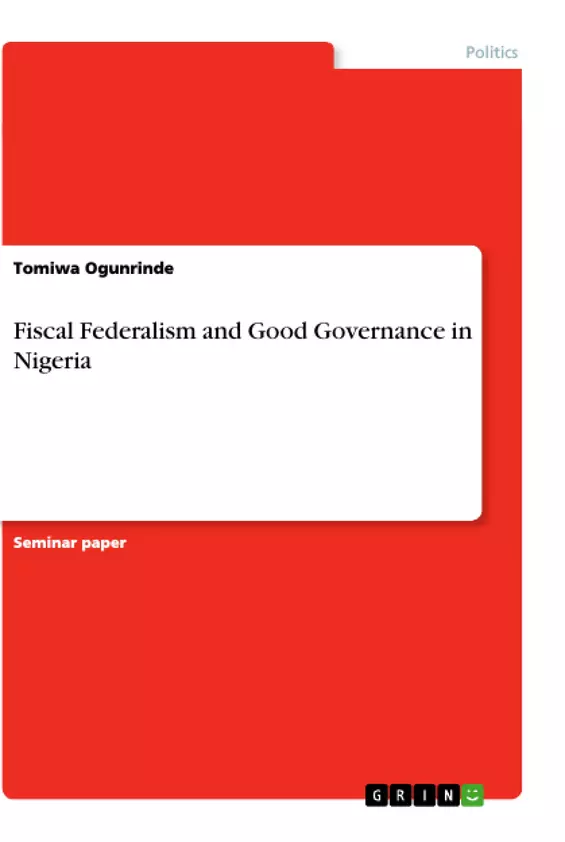The paper examined fiscal federalism and good governance in Nigeria. Fiscal federalism centres on allocation of resources among the federating units and as a matter of fact, acts as a precursor for good governance or otherwise. Qualitative research method was adopted for this paper. Findings revealed that there are contending issues and challenges of fiscal federalism in Nigeria; there is mismatch between revenue sources and functions of the various tiers of government and which in so doing hampers good governance.
Inhaltsverzeichnis (Table of Contents)
- Abstract
- Introduction
- Methodology
- Conceptual Review
- Federalism
- Fiscal federalism
- Discussion and findings
- Conclusion and Recommendations
Zielsetzung und Themenschwerpunkte (Objectives and Key Themes)
This paper examines the relationship between fiscal federalism and good governance in Nigeria. It investigates how the allocation of resources among the federating units influences good governance. The paper utilizes qualitative research methods to analyze various aspects of fiscal federalism in Nigeria, highlighting key issues and challenges.
- The allocation of resources and tax powers among different tiers of government in Nigeria.
- The impact of fiscal federalism on good governance and the challenges of achieving it.
- The role of revenue allocation and utilization in fostering a stable and equitable federation.
- The historical context of federalism in Nigeria and its implications for fiscal arrangements.
- The impact of fiscal decentralization on the performance of public sectors.
Zusammenfassung der Kapitel (Chapter Summaries)
- Abstract: The abstract provides an overview of the paper's focus on fiscal federalism and good governance in Nigeria. It highlights the research methodology, key findings, and conclusions. The abstract emphasizes the challenges posed by the mismatch between revenue sources and functions of various tiers of government, ultimately impacting good governance. The paper advocates for a revenue allocation system that reflects the federal nature of Nigeria.
- Introduction: The introduction defines fiscal federalism as the division of resources and tax powers among federating units, crucial for fulfilling constitutional obligations. It explores the role of fiscal decentralization in improving public sector performance and highlights the increasing demand for devolution to address concerns regarding housing, job creation, social welfare, and healthcare. The introduction emphasizes the concept of federalism as a system promoting unity in diversity, division of powers, and limited autonomy for constituent units.
- Methodology: This section outlines the qualitative research methodology employed in the study. It details the use of content analysis to examine data gathered from secondary sources, including textbooks, journals, reports, newspapers, and online materials.
- Conceptual Review: This chapter provides a detailed exploration of the concept of federalism, examining its characteristics, legal framework, and historical development. It presents various perspectives on federalism, highlighting its role in distributing power between national and subnational governments and fostering intergovernmental cooperation. The chapter further delves into the concept of fiscal federalism, emphasizing its close relationship with federalism and its importance in allocating resources and tax powers to different tiers of government. It also discusses the significance of each level of government having adequate resources to fulfill its functions without relying on other levels.
Schlüsselwörter (Keywords)
The primary keywords of this paper include: fiscal federalism, good governance, Nigeria, federalism, revenue allocation, decentralization, public sector performance, intergovernmental relations, political and economic development, resource control, and equity.
- Arbeit zitieren
- Tomiwa Ogunrinde (Autor:in), 2020, Fiscal Federalism and Good Governance in Nigeria, München, GRIN Verlag, https://www.grin.com/document/1036917



